Ambassador Ghoulem Berrah
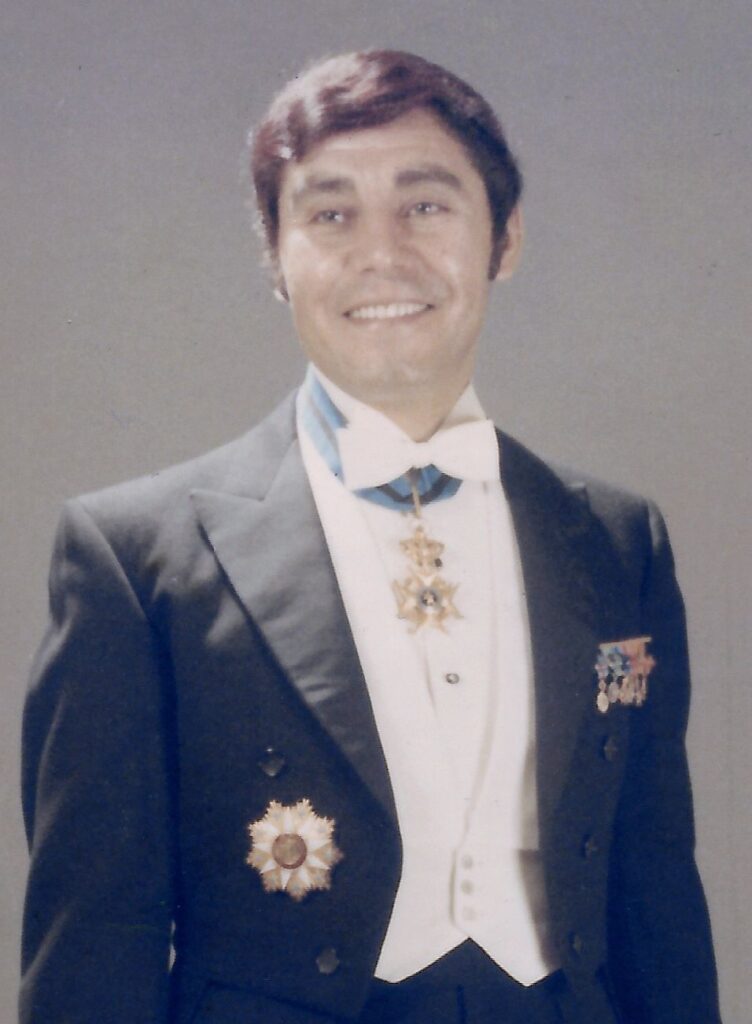
Contact
Dr. Ghoulem Berrah Foundation
2600 Island Blvd, Aventura, FL – 33160, USA
+1 (305) 878-5642
His Excellency Dr. Ghoulem Berrah – a recognized scientist in 1963, an Ambassador and Special Advisor to President Felix Houphouët-Boigny of Côte d’Ivoire from 1965 to 1993. With his untimely passing, Africa has lost a diplomat of exceptional talent, and the world has lost an untiring artisan of peace.
He was born on May 29th, 1938, in Aïn Beïda – a small town situated at the foot of the Aurès mountains in north eastern Algeria. Today, it serves as a road and rail junction and a trading center for agricultural produce. The town was originally founded as a French Military post with two forts, built in 1848 and 1850, with the sole purpose of controlling the powerful Arabized Harakta Berbers.
He grew up with four siblings, comprising of three sisters and an older stepbrother. His mother gave birth to twin boys, but lost one at birth, and the other died at the age of three, when Dr. Berrah was still a baby. Although, his father died when he was only seven years old, he enjoyed a happy and pampered childhood with a loving mother and various paternal uncles overseeing his upbringing.
As a teenager, he obtained a baccalaureate degree at the lycée d’Aumale in the Algerian city of Constantine, on the banks of the Rhumel River, and he departed Algeria to begin studying medicine at a University in Bordeaux, France.
Enlisting in the Algerian Liberation Movement
During his time at the University, he became actively involved in the struggle for Algerian liberation, and he joined the movement for independence from France. This was the beginning of his metamorphosis into an effective leader. As the President for the General Union of Algerian Muslim Students (U.G.E.M.A) in Bordeaux, he demonstrated his organizational abilities and leadership skills within the student body.
In the month of May 1956, a serious incident would alter his way of life. Members of the O.A.S, a French dissident paramilitary organization, fired on a group of Algerian students on campus at the University of Algiers. The sole purpose of the organization when it was founded by the French as a secret Army, was to intimidate the Algerian natives and discourage all forms of revolt within the country, in order to maintain colonial rule. Enraged by the news of what had occurred back in their homeland, the U.G.E.M.A leadership ordered member students in France to embark on a general strike, in total solidarity with their comrades in Algeria
As a result, the French Police began to closely monitor the members of the organization, and fearing for his safety, Dr. Berrah decided to escape from France. With the assistance of professional smugglers at the porous mountainous region between France and Spain, he made his way through the small border town of Saint Jean-Pied-De-Port and arrived in Pamplona, Spain, where he surrendered to the Spanish Civil Guard.
He was detained and subsequently, placed in confinement for several months, before being transported to Madrid, Spain and handed over toafounding member of the nationalist ISTIQLAL party, Mr. Abdelkebir El Fassi. A driving force in the Moroccan struggle for independence from French colonial rule, Mr. El Fassi was also a famed author.
Ultimately, Dr. Berrah was released in exchange for several Spanish soldiers being held captive by the Moroccan Liberation Army in the Mediterranean port city of Tetouan, Morocco. His imminent arrival in Tetouan was heralded as a major victory for the liberation struggle, and he was greeted with some fanfare by Dr. El Khatib, head of the Moroccan Liberation Army.
From then on, Dr. Berrah was adopted by the El Khatib family and treated as though, he was one of their very own. He also claimed them as his family and till today, their relationship continues to flourish. Nonetheless, anxious to re-engage in the liberation struggle, Dr. Berrah decided to enlist in the combat brigade, and underwent tactical military training in Tetouan.
Tetouan’s geographical and unique topography, was strategically advantageous to his covert guerrilla operations within Algeria. Once again, his organizational capabilities and militant activism, would serve as an invaluable asset, enabling him to spearhead the launch of the Algerian Underground Movement, earning him the code name, Dr. Mahjoub.
In Missour, a small town in northern Morocco, located in the Rif Mountains, he gave a new lease of life to an abandoned hospital which had been vacated by the resident French Doctors, and he set up a mobile medical practice there. As gratitude for his services, the local peasants would donate some livestock to aid in the Algerian liberation struggle. He managed to balance his schedule as a doctor at the hospital, while continuing to conduct covert guerrilla warfare as an Algerian liberation fighter.
After several months, he moved on to the Moroccan capital city of Rabat, to commence an Internship program at the Moulay Youssef hospital. Upon arrival in Rabat, he was introduced to many high profile individuals within the affluent political sectors in the country, mostly by Mrs. Fatima Hasssar, niece of Dr. El Khatib, and her husband, Mr. Larbi Hassar. The sudden surge in an expanded nucleus, helped pave the way for him to conduct fund raising activities for Algeria’s National Liberation Front (F.L.N). As an added bonus, he received some scholarships and endowments from four different Embassies.
In March of 1959, Dr. Berrah was invited to China as the head of the youth wing of the F.L.N, to represent the youth of the third world countries. Upon arrival in China, he met with Chairman Mao Tse Dong and Prime Minister Chou En Lai, and traveled countrywide to various universities, where he lectured students about the Algerian conflict with France.
Shortly after he returned to Rabat from China, Dr. Berrah had a conversation with the cultural Attaché at the United States Embassy, Dr. Hammond, an acquaintance and an avid supporter of the Algerian struggle. He informed Dr. Berrah that the U.S had awarded ten scholarships to some elite students in Morocco and expressed regrets that the Ministry of Education had reneged on the offer. He intimated that he saw an opportunity in that there was a possibility of re-awarding the scholarships to some Algerian students, if there was a way to get the green light from the Moroccan government.
Dr. Berrah sought the help of his trusted friend, Mrs. Fatima Hassar, who in turn, approached Princess Lalla Aicha, daughter of King Mohammed V, the Sultan of Morocco. Soon thereafter, he was summoned to meet the Princess at a small reception in the Palace. Much to his delight, the Princess mentioned that she would use her influence to ensure that the U.S government’s scholarship program for elite Moroccan students, would be expanded to include prospective Algerian students. A defining moment with a positive twist of fate that would forever alter his destiny. He was soon awarded a Fulbright Scholarship to study in the United States.
Accompanied by nine of his Algerian cohorts, they arrived in the U.S, where they were greeted by members of the Institute of International Education, in Washington, D.C. Some time later, Dr. Berrah set out to study at the University of Indiana in Bloomington, where he received a grant from the National Institute of Health Research, as he pursued his Masters in microbiology in 1961. He continued his studies in pursuit of a PhD, focusing on a more in-depth scientific research, and finally, he delivered a thesis on the selective and reversible inhibition of the synthesis of bacterial deoxyribonucleic acid (DNA) by phenetyl, earning him a doctorate in 1963.
The Medical Scientist
As a recognized man of science, some of Dr. Berrah’s discoveries were published in a number of medical journals, most notably, Journal of Bacteriology in 1961 and Biophysica ACTA in 1963. His accredited memberships include the American Society of Microbiology, The British society of Microbiology, SIGMA XI and the American Association for the Advancement of Science.
At the Houston conference on viruses and cancer in 1963, he cited the theory of reverse transcriptase, also known as RNA-dependent DNA polymerase and established the hypothesis based on a DNA polymerase enzyme that transcribes single-stranded RNA into a single-stranded DNA – a synthesis that induces viral influence on the onset of cancer. The enzyme was isolated some twelve years later by David Baltimore, Howard Temin and Renato Dulbecco and the trio shared a Nobel Prize in 1975 for their contribution to Physiology or Medicine. The citation read – “for theirdiscoveries concerning the interaction between tumor viruses and the genetic material of the cell.”
Dr. Berrah went on to receive several offers to teach at some of the most prestigious Universities in the United States, including UCLA, Johns Hopkins and The United States Institute of Health. However, he chose to teach at the Yale School of Medicine, where he became one of the youngest professors on the faculty. He was awarded the Brown and Cox fellowships while at Yale. In 1983, he was inducted into the New York Academy of Science as a permanent member .
President Félix Houphouët-Boigny – A Meeting of Fate
During his tenure at the University of Indiana, Dr. Berrah would frequently conduct lectures at various Universities and Churches around the state, to inform on the Algerian War. He would also visit the United Nations on numerous occasions, in an effort to stay abreast of the Algerian Liberation struggle and other pertinent International Politics.
Sometime in May of 1962, President Houphouët-Boigny of the Ivory Coast and his wife,Marie-Thérèse Houphouët-Boigny came to the United States as guests of honor of President John F. Kennedy and his wife, Jackie Kennedy. Through the assistance of the Ivorian Ambassador to the U.N, Mr. Usher Assouan, who happened to be a personal friend, Dr. Berrah was summoned to meet with President Houphouët at the Waldorf Astoria hotel in New York City.
The meeting was very cordial, warm and relaxed. Despite having just met each other, the two men hit it off instantly like old friends. In a defining moment, President Houphouët’s humility would resonate in words so profoundly sincere – “Africa is in much need of you than the United States. We are in the process of building a country. Come and help us. You will be free to leave and go wherever you want to go. We have many things to do together.” Dr. Berrah asked the President to give him some time to think things over.
He left the meeting and returned to Indianapolis to conclude the final phase of his doctorate. He however, remained in constant contact with the President. After Algeria achieved Independence from France in June of 1962, he travelled to his homeland, where he aspired to live a happy and peaceful life. But things did not go as expected. He disagreed with the newly elected President, Ben Bella’s Trotsky policies. Conversely, after only ten days in the country, Dr. Berrah decided to leave.
He returned to his tenure as a lecturer at Yale University in order to extrapolate on further research in virology. Throughout that period, he espoused that Africa would have to position itself on an equal level of development on par with the rest of the world, because he was convinced that leveling the playing field would usher in a new chapter, leading to peace and understanding amonghumankind. In 1965, he decided to respond to President Houphouët-Boigny’s request and report to duty in the Ivory Coast.
An Active and Discrete Diplomat – Special Envoy to the President
From the very beginning, President Houphouët-Boigny and Dr. Berrah developed a very deep bond and the ties that bound them together was quite unique. The President considered him a spiritual son, a younger brother and a close confidant. They were together and virtually inseparable from the moment Dr. Berrah arrived in the Ivory Coast in 1965, until the passing of the President in 1993. He helped the President on many levels as his Special Assistant. He was assigned the powers of a Special Envoy to act as a Diplomat at Large.
Dr. Berrah was a gentleman in the truest sense of the word. To say that he was spontaneously witty would be an understatement. He was notorious for using his allure, calming demeanor, and soothing sense of humor to make light of even the most complex situation.
Perhaps, it was a bit of the good old-fashioned chivalrous piety in the man, which prompted most who encountered his infectious personality to walk away with a reassuring feeling and a deep sense that anything was possible. He embodied a level of intellectual prowess and a tempered personal demeanor that most certainly would become the catalyst to his diplomatic successes.
His pithy mannerisms and prolific negotiation skills would sometimes inspire even the most bitter rivals with entrenched convictions to laugh at themselves and promise to unite their dissimilar objectives and embrace peaceful solutions. These very unique attributes, bolstered by his knack for finding resolutions when confronting adversities on a global scale, earned him the unequivocal trust of the President. A message to President Anwar Sadat of Egypt in 1977, will indeed affirm President Houphouët-Boigny’s sentiments – “Dr. Berrah is the one in whom I place all my trust”.
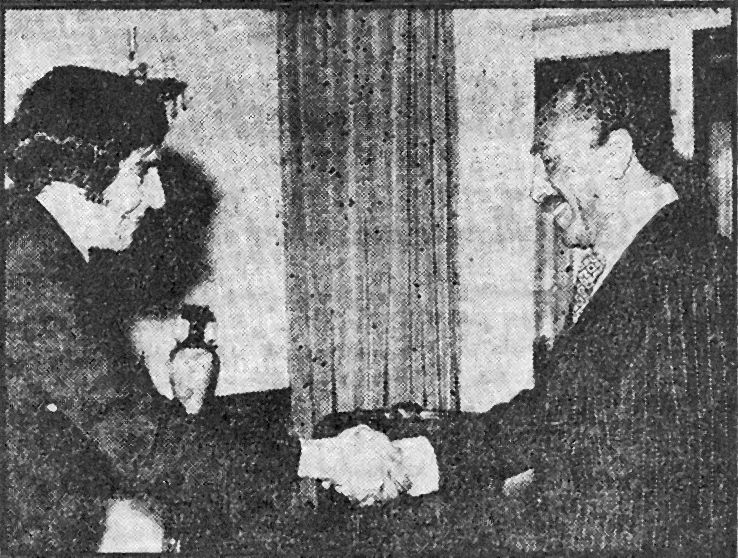
In a special decree signed by the President, Dr. Berrah became a naturalized Ivorian citizen. He initiated talks with President Houari Boumediene of Algeria, setting off on a diplomatic quest to bridge the gap of cooperation between the two countries. His unique approach and diligent maneuvering throughout the arduous process was tested time and time again, because the two heads of state were very different in stature, background and orientation. Boumediene was a Socialist and a former Colonel in the F.L.N who enacted a policy of militancy in conflicts. Whereas, President Houphouët-Boigny preferred a method of dialogue and diplomacy.
After a series of diplomatic maneuvers that escalated into a heated political stalemate, during which the Algerian Ambassador to the Ivory Coast was recalled to Algiers in 1969, Dr. Berrah tirelessly continued to spearhead an assiduous process of confidentiality between Abidjan and Algiers. His relentless and undaunted pursuit to find a common ground, would finally lead to a thaw in their icy relationship and establish a harmonious vision for the two leaders with regards to the problems concerning Africa’s role in the world.
The friendship of the two countries was eventually sealed when the leaders first met at the O.A.U summit in Addis Ababa in May of 1973. Thereafter, the two countries reaffirmed their alliance and cooperation at the summit for the Non-Aligned Movement in Algiers in September of the same year. Oddly enough, the new friendship would soon be put to a test. October 6th, 1973 marked the beginning of the Yom Kippur War, also known as the Ramadan War, between Israel and a coalition of Arab states led by Egypt and Syria.
The war began in earnest when the coalition launched a joint surprise attack in an effort to take back the lands that had been seized by the Israelis during the 1967 war.President Boumédiène sent Algerian troops and foreign aid to both Egypt and Syria. He then attempted to garner the support of the Sub-Saharan African countries by highlighting the presence of Israeli troops on the African side of the Suez Canal
. As a result, most of the African countries severed their diplomatic ties with Israel in support of Egypt. In spite of this, President Houphouët-Boigny doubted the efficiency of the approach. He pointed out that the Israelis continued to receive military and other forms of financial aid from the United States. Therefore, ever faithful to his principle of engaging in dialogue, he embarked on a diplomatic mission to the U.S at the invitation of President Nixon.
President Houphouët-Boigny and his Envoy, Dr. Berrah arrived in New York on October 3rd- three days prior to the Ramadan War. Upon returning from his trip to the States, he sought to reassure Boumediene of his unwavering support for the stance taken by the O.A.U body. On October 30th, 1973, he sent his emissary Dr. Berrah to Algiers with the followingmessage – “It is only with the expectation and hope to help establish peace in a region which is in dire need of peace that I accepted Nixon’s invitation.
President Nixon invited me in order to seek my impressions and opinions. In our conversations, he said to me, and I quote,” – “We know how dear peace is to you and we are calling on you to help us find a solution to the Arab-Israeli problem. You should talk to Prime Minister Golda Meir, she may listen to you because you are free from any internal or external pressure. Tell your Arab brothers that I will do my best to find a solution and I urge you to talk to President Boumediene. He is a very wise and responsible head of State.”
President Houphouët-Boigny offered his personal sentiments – “To me, President Nixon seemed genuinely honest in his peace overtures. Beyond that, he did not give me any other details. I haven’t managed to get in touch with Prime Minister Golda Meir. However, I ask that you bestow your trust in me and permit me to try something. If I do not succeed, I will not hesitate to undertake the appropriate measures which may include severing ties with the Israelis and not only will I support you completely, I will also align myself with you.”
During their meeting, Boumediene clarified his position to Dr. Berrah – “Our mutual positions should be very clear. At the moment, Israel is occupying a part of African territory. Based on the current situation, we cannot and should not be gratified by promises made by President Nixon. Asking for an official statement is not an impossible request. The Ivory Coast is a great country and I am convinced more than anyone that President Houphouët-Boigny is sincere. He is neither under pressure nor does he harbor any other motives.
There is absolutely no doubt about his political, intellectual and moral honesty. If I could imagine for one second that there was a glimmer of hope for him working with President Nixon and that there was a glimmer of hope that Prime Minister Golda Meir would listen to him, I would stand behind his proposition. If I thought that he could single handedly take control of the situation, I will be behind him no matter what. However, these dramatic turn of events call for very different measures.”
In his message to President Houphouët-Boigny, Boumédiène explained his trenchant position – “Before the war, we debated this problem in Addis Ababa and I did not oppose nor did I argue against your style of diplomacy. However, today, things have changed and the arrogance of the Israelis can only be compared to our humiliation and the suffering of our military men on the battlefield. Nixon is defending his own interests and ensuring his political viability and please allow me to commend Mrs. Golda Meir on this quote, – “We have only one God and one friend, The United States.”
The message is very clear and the sentiment calls for our meditation. For us, this occasion is a call to strengthen our newly energized Arab and African solidarity and use it in the best interest of Africa and the Arab world. You, President Houphouët-Boigny, are not an ordinary man. This is why I have opened myself to you. Regardless of your decision, you can count on my friendship and we will remain friends. I will never say anything to embarrass you but I also do not wish to see you alienated, because I know and appreciate your honesty”. In closing, he said to Dr. Berrah – “It is for him, a sacred duty to preserve the unity of Africa and the sanctity of our continent.”
On October 31st, President Houphouët-Boigny responded in kind to President Boumediene through a message delivered by his faithful Emissary, Dr. Berrah – “I do understand your position and that of my Arab brothers too. Cairo and Damascus are within reach of bullets and other weapons of war. And the current situation is much more volatile than before we undertook our diplomatic efforts, prior to the Ramadan war.
I have remained actively involved ever since our last meeting and I have posed several questions to Prime Minister Golda Meir. Although, she may not provide me with satisfactory answers, I will remain open minded and continue the fight for our unity.” A week later, on the 7thof November, the Ivory Coast terminated its diplomatic relations with Israel.
Once again, Dr. Berrah embarked on a highly sensitive mission to Algiers the very next day, carrying a powerful message from President Houphouët-Boigny – “The decision to cease diplomatic relations with Israel was made in the spirit of solidarity with my Arab brothers. This decision is solely based on the fact that you are a man of integrity and also, paramount in this instance, is the need to unite our continent.”
In a period when the African continent was beginning to nurture its own path, and while most newly independent countries on the continent were charting their own post-colonial political course, communications within diplomatic circles were fluid, urgent and hectic
. President Boumediene had severed ties with the United States during the six-day war in 1967, in the aftermath of the U.S Airlifts that delivered arms and other reinforcements to Israel. However, as a consequence of the diligent diplomatic efforts on the part of Dr. Berrah, Houphouët-Boigny’s doctrine had an inspiring and positive influence on Boumediene.
During the Arab summit in Rabat in 1974, President Boumédiène met with Dr. Berrah and asked him to deliver a message to President Houphouët-Boigny; in which he stated – “As a matter of fact, I would like to inform you that when U.S Secretary of State Henry Kissinger visited us in Algiers, I decided to reestablish diplomatic relations with the Americans. You are absolutely correct in asserting that the U.S is certainly a great power with which one must interact, if not embrace. One cannot forever turn their back on reality and to history.”
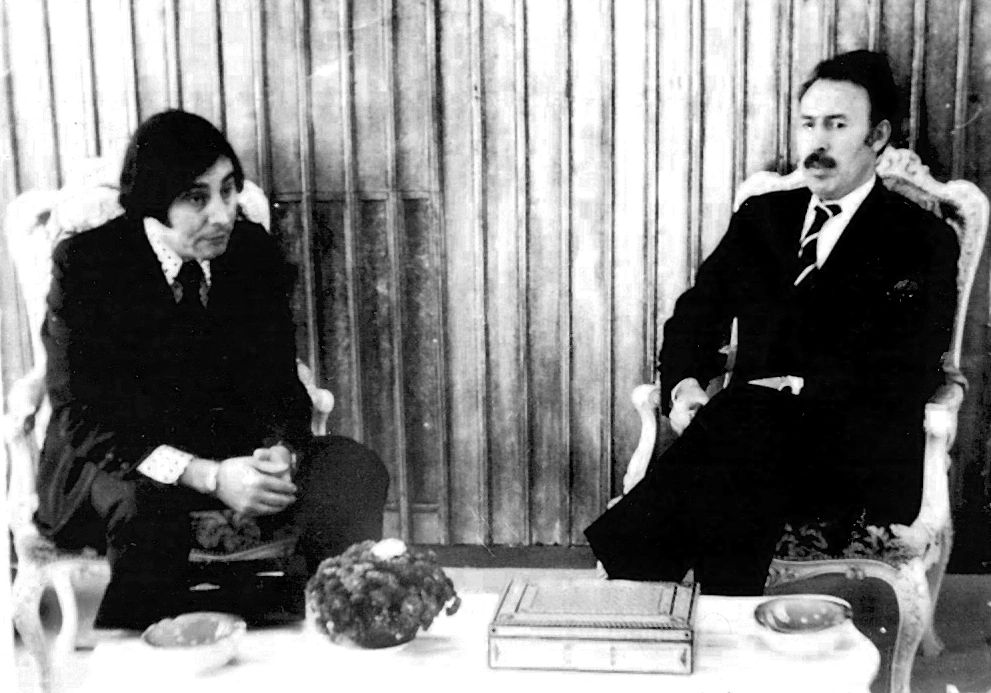
For Dr. Berrah, consultations and mediation between Algiers and Abidjan during the Apartheid years took center stage, as he sought to clarify President Houphouët-Boigny’s position on the South African gridlock to Boumediene. Initially, the latter thought that the Ivorian President’s diplomatic stance on the Apartheid regime might be seen by some as an inferred complicity. But as a result of Dr. Berrah’s diplomatic efforts, the crux of this notion was eventually dispelled and the goodwill between the two nations remained unshaken.
President Houphouët emphasized that the African and Arab solidarity must be based on deeds and not mere words, if it were to have a significant impact on the realities of everyday life. In his appeal to the Arab nations, he spoke of implementing a new Global economic order and stressed the importance of utilizing their petroleum subsidies to boost the valuation of all raw materials. He asked that the Arab nations make investments in Africa in order to speed up the development of some of the poorest countries.
He received overwhelming support from President Boumédiène who set out on an aggressive crusade to garner support from the Arab world. As a result, the African Development Bank was established and headquartered in Abidjan. The influx of capital from Arab governments was quite significant. Dr. Berrah’s tireless efforts, were also key to a successful dialogue amongst the African and Arab leaders. This fact did not go unnoticed by President Boumédiène who looked forward to Dr. Berrah’s visits to Algiers. In June of 1975, he expressed appreciation and thanked President Houphouët-Boigny “for having sent our mutual friend, Dr. Berrah.”
Secrecy in Mission
On his diplomatic expeditions, the Israeli – Palestinian conflict had proven to be quite an arduous endeavor that yielded very little despite his tireless dedication. He pursued all the necessary avenues and tackled the complex issues, working with Dr. Isam Sartawi, Assistant to P.L.O Chairman, Yasser Arafat, whom he’d met at various O.A.U summits.
Because of his intrinsic convictions as a servant for peace, he committed himself to the belief that peace between the Israelis and the Palestinians was paramount in his diplomatic efforts. As a consequence, Dr. Berrah introduced Dr. Sartawi to President Houphouët-Boigny, with the sole aim of establishing communication links between the Ivorian leader and the Chairman of the P.L.O. From then on, Dr. Sartawi became a permanent liaison. At the same time, the Ivorian President would meet in private with Israeli Prime Minister Rabin and continue his diplomatic efforts with his counterpart at the White House.
Eventually, Arafat was welcomed as a distinguished leader by all the heads of States at the 1973 Non-Aligned summit in Algiers. The year after, he was recognized by the members of the U.N General Assembly, which was chaired by then Algerian foreign minister Bouteflika. However, he was viewed with suspicion by the United States.
This circumstance prompted him to ask for Dr. Berrah’s assistance in persuading President Houphouët-Boigny to use his influence and impress upon the U.S that he was on a quest for peace.
On June 11th, 1975, Arafat asked Dr. Berrah to deliver the following message to the Ivorian President; “El Fath gives President Houphouët-Boigny the power of attorney and entrusts him with the Palestinian interests. We are always willing to commence discussions with the United States, however, all our previous attempts have been dismissed. We put all our trust in you and give you carte blanche to express our position and affirm our desire for peace. And their wish to see the Russians and communism out of the Middle East is possible with the acknowledgement of our rights.”
In a moving response to Arafat, which was sent along with his faithful confidant, Dr. Berrah, President Houphouët-Boigny was clearly very emotional – “By sending me a Bible through Dr. Sartawi, you have indeed brought tremendous joy to my heart. What comforts me the most is the thoughtfulness that inspired your choice for this priceless gift.
Guided by my unshakable faith in God’s justice, I will spare no effort to make those who are responsible for this situation understand that in orderfor fair and lasting peace to prevail at last in this land of love, where God revealed himself three times to humans, it is an absolute necessity to not only assert as we so often hear, the rights of the Palestinian people, but to also return those poor Palestinians to their native land. I am absolutely aware that after the acknowledgement of your rights, you wish to come to a frank understanding with Israel.”
The communication links between Arafat, Dr. Berrah and Houphouët-Boigny became quite robust over time and Chairman Arafat took note of this fact. In a message to the Ivorian President on June 11th, 1975 – “Your representative was the only non-Palestinian to attend all the meetings at the summit last summer in Cairo. I have always been a supporter of peace and your Special Envoy, Dr. Berrah will attest to this fact, after having spent almost two days with me in Beirut last month in the midst of some Special events.”
Dr. Berrah and President Houphouët-Boigny remained faithful to their diplomatic efforts. They positioned themselves as the advocates of dialogue and direct negotiations between enemies. Their stance was not exclusive to the Palestinian cause. On August 26th, 1975, the Ivorian President shared the following message with Arafat – “In regards to the circumstances and the dialogue with South Africa, I only rely on my faith in peace and I believe that there are only two ways to solve any kind of problem; dialogue or war.
The measured way is the path of dialogue and sometimes the fastest way is the use of force. But historically, no force has ever been for eternity. Tell Arafat that I will be a servant for fairness and lasting peace until the end of my days. This is why I will continue to say that beating around the bush is a criminal act. The Palestinians must recover their land. For the time being, I have emphasized to the Israelis, that for the Palestinians, peace without the return of seized lands, and a return to their homeland is unacceptable. And they realize this is the truth.”
Chairman Arafat sent the following response to Houphouët-Boigny on September 2nd, 1975 – “The law of engagement assumes that the opposing parties must first acknowledge each other. This is the basic premise for dialogue. We have put forth a declaration that recognizes the Israelis as full citizens. But they refuse to recognize us”. In his response, President Houphouët-Boigny offered some wisdom – “Gambling is worthy of blame. However, if one has to gamble, the cards must be played on the table. Not under the table. All modesty aside, I will keep moving on, because I still believe there is room for hope.”
Nonetheless, the Palestinians still believed that he was a trustworthy ally. A communiqué to the President by Dr. Sartawi would state – “All the Palestinian leadership and all the Palestinian people believe in your faith in dialogue.” Finally, the policy of dialogue had found its footing and the idea was being echoed in a way that brought the parties closer to each other.
In 1975, the Israeli Council for Israeli-Palestinian Peace (I.C.I.P.P) was founded. General Mattityahu Peled, also known as, Matti Peled, a comrade in arms with Prime Minister Yitzhak Rabin during the six-day war, was one of the founding members. Two of his co-founders, Uri Avnery and Arie Eliav, would be by his side during some historic negotiations with the Palestinians. The I.C.I.P.P charter called for the withdrawal from the occupied territories, which was being held by the Israelis in the aftermath of the war of 1967, as well as the creation of an independent State in the territories with a divided Jerusalem between the two States.
A series of secret meetings were held in Paris, where the Israelis would meet their Palestinian counterparts for the very first time in 1976. Representatives at the meeting included, General Matti Peled, Uri Avnery and Arie Eliav on the Israeli side. The Palestinians were led by Dr. Sartawi. Houphouët-Boigny’s Envoy Dr. Berrah also took part in the meetings as an observer. Some seven years later, Dr. Sartawi was assassinated in Albufeira, Portugal, in 1983 by a Palestinian.
On the evening of November 4, 1995, Prime Minister Rabin was also assassinated by Yigal Amir a radical right-wing Orthodox Jew, who opposed the signing of the Oslo Accord. For the P.L.O, the pathof dialogue was a decisive step and General Peled always believed that the Oslo accord was at least in part, “a late flowering of seeds he had sown with his friends in the 1970’s.”
Playing an important role during the Cold War
In a message to the Ivorian President, Somali President Siad Barre thanked him for agreeing to mediate between France and Somalia in a quest to find an honorable solution to resolve the painful problem of Djibouti, which as he pointed out, was an “explosive situation” he was not responsible for.
He also reiterated on his efforts to initiate dialogue with France, through some Arab allies of the French government but the efforts failed. Fully aware of the special relationship between President Houphouët-Boigny and the French government, he asked Dr. Berrah to convey the following message –
“Consequently, I count on you and exclusively on you, to continue to work on thawing the situation in the interest of France and Somalia as well. I am sure you will succeed. As far as we are concerned, you have carte blanche to act and negotiate on our behalf. As a result of your agreeing to mediate and because of the fact that we trust you, we promise to give our consent to anything you draw up with France and we will abide by it, regardless of if it is fair, provided that it comes from you.”
Together, President Houphouët-Boigny, who possessed the political and moral authority and Dr. Berrah, who had become highly regarded by many Heads of States, would become a very formidable team. Using every power and means at his disposal, the Ivorian President embarked on a passionate negotiation process in search of a solution to a very complicated problem. Djibouti gained independence from France on June 27th, 1977 but due to its strategic importance to France, the French government would maintain a military base in the country.
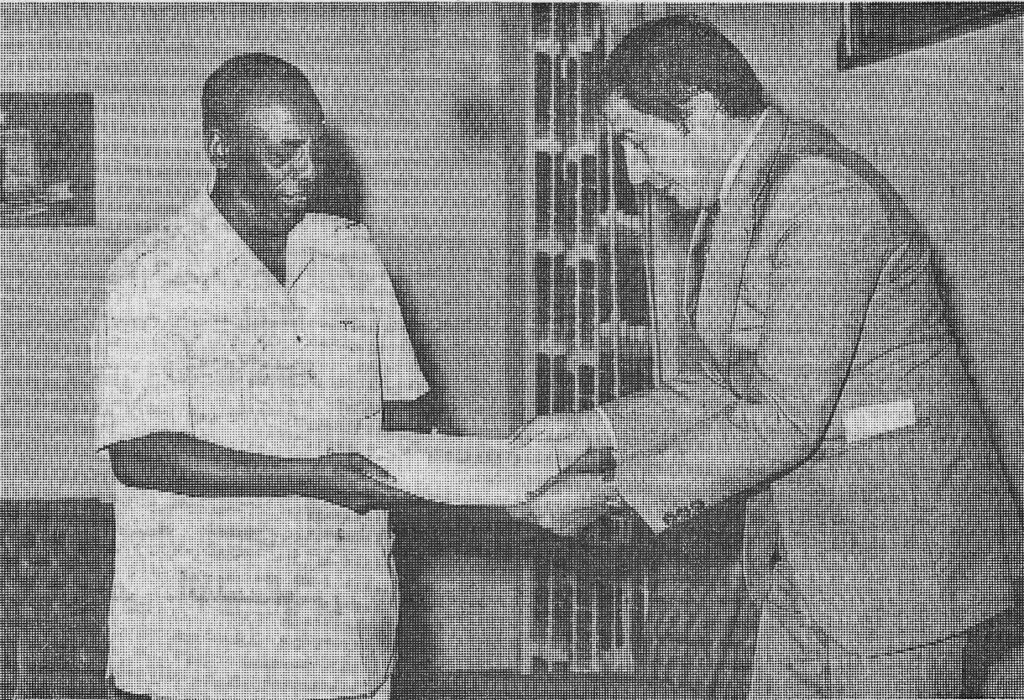
During the Cold war years, the Port of Berbera, situated in the Gulf of Aden, was strategically important because of its easy access to the Indian Ocean and Persian Gulf region. Prior to 1969, Somalia sought military aid and support from both the United States and the USSR. In 1969, following the assassination of Somalia’s second president, Abdirashid Ali Shermarke, the military staged a coup on October 21st, (the day after Shermarke’s funeral), and took over office. Siad Barre was installed as president of the Supreme Revolutionary Council (SRC), the new government of Somalia.
In 1972, then Defense minister of the Soviet Union, visited Somalia and an agreement was signed to improve and modernize the Port of Berbera in return for Soviet access to the facilities. This was meant to counter the American military activities in the region. Upon signing the Treaty of Friendship and Cooperation with Moscow in 1974, Mogadishu began taking delivery of numerous weapons systems and the amount of Soviet military advisors increased in number, while a large number of Somali military personnel embarked on training missions in the USSR.
President Houphouët-Boigny and his advisor, Dr. Berrah tried in vain to convince Siad Barre to distance himself from the USSR. The June 30th, 1975, issue of the Baltimore Sun reported that on June 29th, a group of International reporters were invited to Somalia by the governmental officials to disprove the presence of Soviet missile storage facilities. However, they were denied access to the Port of Berbera.
On July 4th, 1975, Dr. Berrah met with President Siad Barre in Mogadishu. He was asked to convey the following message to President Houphouët-Boigny; “Some Americans have said that we have a base in Berbera. Berbera is a Somali port, which is open to all our friends. The French and Italians have already used our facilities in Berbera and all ourother friends are welcome to use our facilities. All our facilities.”
During the Ogaden war in 1977, the Soviets aligned themselves with Ethiopia. Siad Barre reacted by terminating the Treaty of Friendship and Cooperation with Moscow and expelled all Soviet advisors. Under the circumstances, he informed Dr. Berrah and the Ivorian President that he was ready to give the United States uninhibited access to the Port of Berbera.
To reaffirm his stance, he invited Dr. Berrah to Mogadishu and handed him a letter to be conveyed to President Houphouët-Boigny requesting that they inform the United States of his intentions. Consequently, Dr. Berrah traveled to Riyadh, Saudi Arabia to meet and hand deliver the written message to President Jimmy Carter, who was on an official visit to the country on January 3rd, 1978. Talks began in 1979 and on August 22nd, 1980, Somalia and the U.S signed a treaty for the military use of the Port of Berbera.
A Man without Religious or Human barriers
Ever faithful to his belief in dialogue, Dr. Berrah’s philosophy was applicable in all spheres. A devout Muslim, he charted nine Pilgrimages to the Hajj in Mecca, made significant financial contributions to the ground breaking of a Church and assisted in the development and embellishment of many Mosques.
He hosted more Bishops and Priests for luncheons and dinner gatherings than Imams. One of his closest friends whom he often referred to as his brother, is His Excellency, Archbishop Mullor Garcia, former Nuncius to the Ivory Coast, and a close collaborator to his holiness, Pope John Paul II, a current member of the congregation of the Saints at the Vatican. Dr. Berrah met all of the Popes during his lifetime – Pope Paul VI, Pope John XXIII and he met Pope John Paul II several times. He also befriended the Prelates of the Opus Dei.
He traveled to the Vatican City in 1990, not as a Special Assistant to the President, or as an Envoy, but as a devout Muslim on a quest to convince his holiness Pope John Paul II to come to the Ivory Coast to bless the “Our Lady Of Peace Basilica”, which was built by President Houphouët-Boigny in Yamoussoukro. In an attempt to prevent the Pope from embarking on the journey, detractors from around the world voiced their disapproval, claiming that the Basilica was either too large or that the decision by the President to build such a magnificent Christian structure in a predominantly Muslim country was extremely insensitive.
Prior to embarking on an official mission to the Vatican, Dr. Berrah responded to these criticisms by being the voice of calm and reason – “For Muslims in the Ivory Coast, there is nothing too large or too beautiful for God.” Ultimately, he succeeded in securing a commitment by the Pontiff for the consecration of the Basilica and he also convinced the powerful Imams in the country to attend the ceremony; in his historical sermon on September 10th, 1990, Pope John Paul II extended his thanks to the Imams of the Ivory Coast for attending the ceremony.
Dr. Berrah crossed all fences and broke through several barriers through which many still continue to stumble. He was an artisan for peace and justice. When he joined the NAACP, he was on a mission to clarify the Algerian liberation struggle but he cherished his membership and participated in the cause for equality and justice. He took part in the march of 1963, led by Martin Luther King Jr., in Washington, D.C.
A white man with deep blue eyes – a Muslim – a renaissance man. He cherished the diversity of our human race. He stated more than once that, “If God had wanted everyone to look alike, same race, creed, or color, or even for that matter; if he had meant for all of us to be identical with similar characteristics, he would have made us so.”
He married a Sub-Saharan African woman from the Ivory Coast, black, a devotee of the Catholic faith, whom he met over 40 years ago. He retired from politics in 1993, after the passing of President Houphouët-Boigny, and he returned to the United States. Living by his convictions and undaunted belief that the radix of most solutions to the world’s problems can be found in the United States, he gave credence to the fact that any elected President must have an intrinsic understanding of the world at large.
Thus, inspired by then Presidential candidate Barack Obama in 2007, who espoused the importance of dialogue with all countries, including the enemies of the United States, he committed himself to campaigning vigorously and passionately for his election in South Florida. As a gesture of gratitude, he received a thank you letter and an invitation to attend the President’s inauguration in Washington, D.C on January 20th, 2009. After the President had been sworn into office, Dr. Berrah continued to send him his comments and share his opinions on different matters.
Dr. Ghoulem Berrah passed away peacefully on Friday, March 4th, 2011 in his Florida home. As a true testament of his life, the gathering at his funeral included family and friends from all faiths, including Muslims, Christians and Jewish.
By: Nana Yalley extracts from A Dream for Peace – A Memoir by Dr. Ghoulem Berrah.
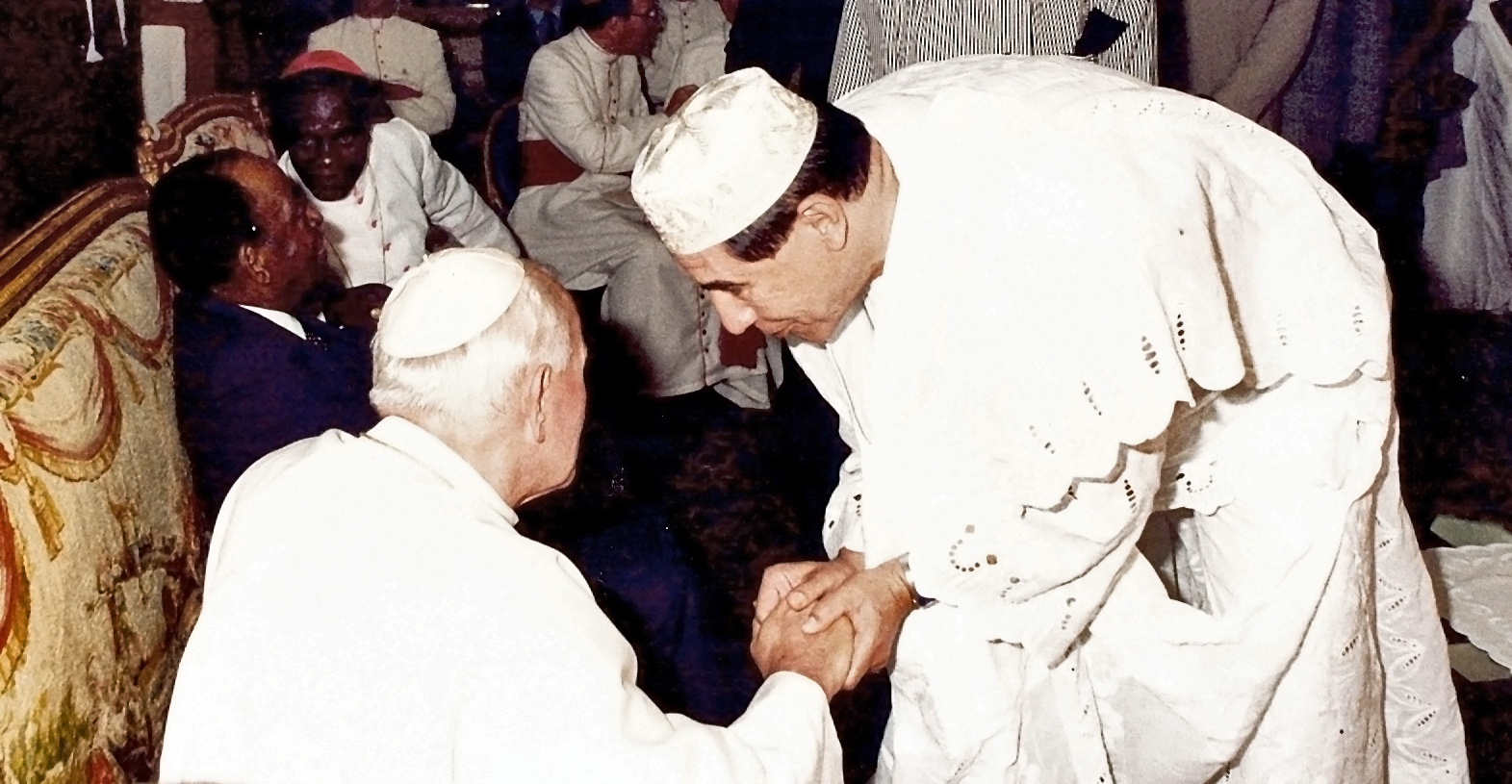
Ambassador Berrah and Pope John Paul II
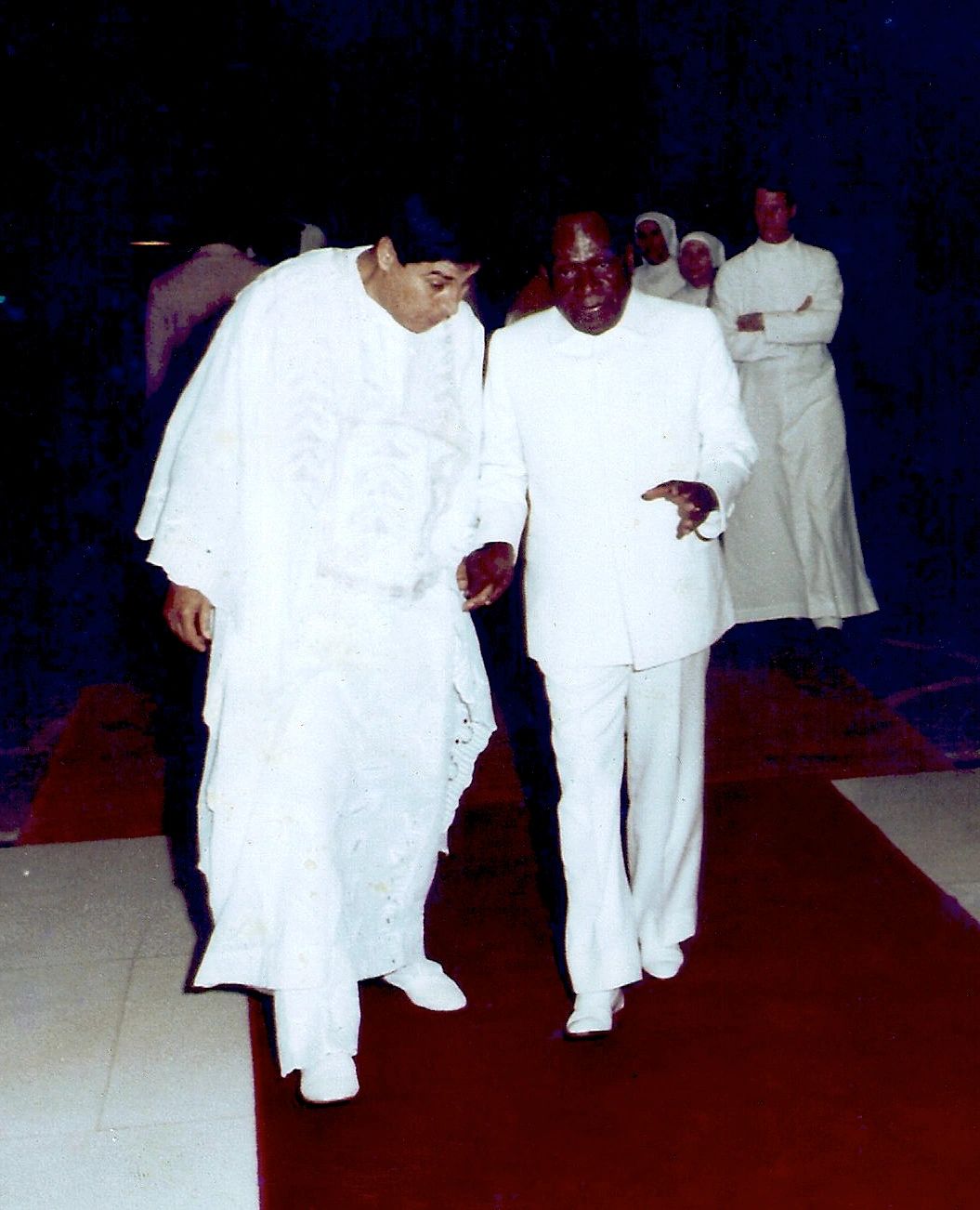
Ambassador Berrah with President Houphouët-Boigny


